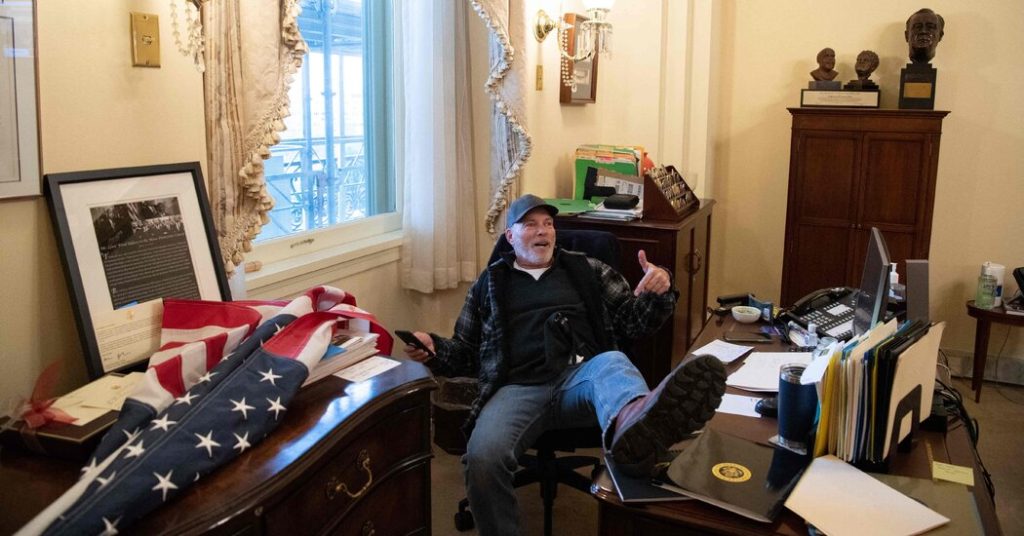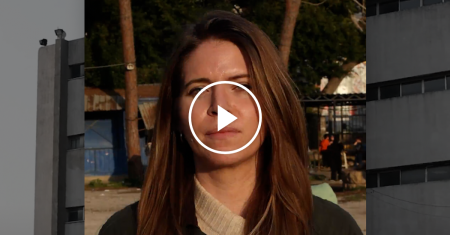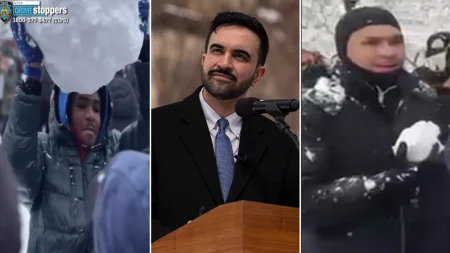Richard Barnett, infamously photographed with his boot on a desk in then-Speaker Nancy Pelosi’s office during the January 6th Capitol riot, remains a potent symbol of the day’s events. His image, capturing a blend of vandalism, menacing undertones (given he carried a stun device), and open disdain for democratic institutions, solidified his place in the narrative of the insurrection. While Washington D.C. has long since returned to a semblance of normalcy, Barnett’s journey over the past four years, from conviction and sentencing to apparent attempts to capitalize on his notoriety, offers a compelling glimpse into the lingering impact of January 6th and the evolving political landscape surrounding it. Currently incarcerated in a low-security federal prison, Barnett, despite lacking internet access, continues to broadcast his opinions on social media, cultivating a following among right-wing supporters who view him as a hero. His future, like that of many others involved in the Capitol riot, is intertwined with the political fortunes of Donald Trump, who has pledged to pardon individuals like him.
Barnett’s case stands out among the nearly 1,600 prosecutions related to the Capitol riot. While many convicted individuals have resumed their lives, Barnett remains incarcerated, his conviction a rallying cry for the right, even as Trump and his supporters attempt to downplay the severity of the day’s events. Barnett’s actions within the Capitol, documented by body camera footage and his own admissions, depict a man who entered Pelosi’s office suite armed, stole an envelope bearing her signature, and left a crude note. His confrontational interactions with law enforcement, both inside and outside the Capitol building, further underscore his defiance of authority. He openly admitted his actions to a reporter on the day of the riot, seemingly anticipating his arrest.
Barnett’s legal proceedings were marked by displays of frustration and defiance. He publicly lamented the slow pace of the legal process, while prosecutors later accused him of attempting to profit from his notoriety by selling autographed photos of himself in Pelosi’s office and exploring copyrighting his note. His defense strategy at trial was unconventional, portraying him as a harmless, if eccentric, “redneck uncle” rather than a domestic terrorist. Despite his claims of being an “idiot” but not a criminal, the jury swiftly convicted him on all counts. The judge, upon sentencing Barnett to over four years in prison, acknowledged his apparent relish of the notoriety he gained from the events of January 6th.
Barnett, like Trump, has experienced both setbacks and potential opportunities for legal reprieve. A Supreme Court ruling in June 2024, which narrowed the scope of the “obstructing an official proceeding” charge, could potentially aid his appeal, although an initial request for early release pending the appeal was denied. The election of Trump, which Barnett reportedly learned about via a prison radio, offered a renewed sense of hope. Trump’s promise to pardon individuals involved in the January 6th riot positions Barnett as a potential beneficiary of such a move.
Barnett’s continued engagement with social media, despite his incarceration in a facility that prohibits internet access, suggests a concerted effort to maintain his public profile. He has expressed opinions on various political issues, including the pardon of Hunter Biden and the government spending deal, further solidifying his image as a political commentator even from within prison walls. His pledge to grow a goatee until all “J6 political prisoners” are freed serves as a symbolic gesture of solidarity and a reminder of his ongoing cause. It’s believed that someone outside the prison is posting on his behalf, circumventing the facility’s restrictions.
Barnett’s story underscores the complexities surrounding the legacy of January 6th. He remains a polarizing figure, revered by some as a patriot and condemned by others as a criminal. His ongoing legal battles, combined with his continued efforts to maintain a public presence, ensure that his name and image will remain intertwined with the narrative of the Capitol riot for the foreseeable future. His fate, and the fate of others involved in the events of that day, remains intertwined with the political trajectory of Donald Trump and his promises of pardons. The ultimate impact of Barnett’s actions and his symbolic representation of the January 6th insurrection remains to be seen as the legal and political landscape continues to evolve.











